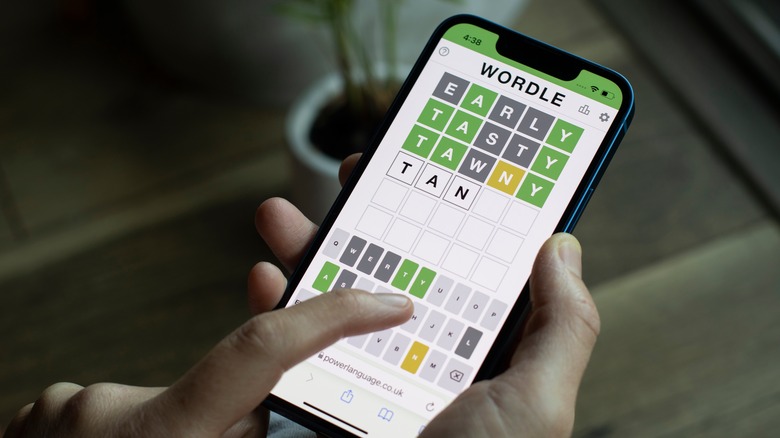The Surprising Way Wordle Can Actually Boost Brain Power
Whether you've seen references to it on social media or in the news, there's no denying that Wordle has taken the country by a storm. This is a simple word game in which the player has six attempts to guess what the five-letter word of the day is (via CNET). When a player guesses a word, the tiles will change color to show whether each letter in the guessed word is also in the word of the day. It's a fun, addicting game that's a great way to spend a lunch or coffee break.
But Wordle isn't just about fun and games. According to Healthline, playing this game regularly can also improve your cognitive health. "Puzzles and games, especially those involving novelty, can stimulate and challenge key parts of the brain, including reasoning, language, logic, visual perception, attention, and flexibility," said Dr. Douglas Scharre, a neurologist and director of the Center for Cognitive and Memory Disorders at The Ohio State University Wexner Medical Center. Playing these types of games is a great way to prevent cognitive decline as you age. If you have a Wordle obsession, don't be ashamed about it! Your brain is thanking you.
Other ways to improve cognitive health
Getting your daily dose of Wordle isn't the only way to improve your cognitive health. According to Harvard Health Publishing, eating a well-balanced and plant-focused diet, exercising regularly, getting enough sleep, managing stress, and staying social are all as important as challenging your brain. According to Psychology Today, staying curious and creative is also a valuable skill that can positively affect your brain as you age. Studies have found that participating in activities like arts and crafts, reading, and music can improve cognitive function in people of all ages.
Brain-training activities like meditation are also shown to be quite beneficial. A 2013 study found that meditation may even slow the progression of cognitive disorders related to age like Alzheimer's disease. "This is a small study and more research is needed to further investigate these results, but we're very excited about these findings because they suggest that MBSR [Mindfulness-Based Stress Reduction] may reduce hippocampal atrophy and improve functional connectivity in the same areas of the brain most affected by Alzheimer's disease," study author Rebecca Erwin Wells, MD, MPH said. By keeping your brain as active as possible, you can keep your mind sharp well into old age.


